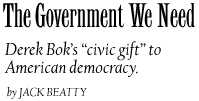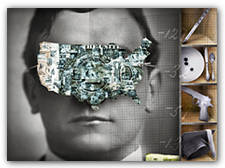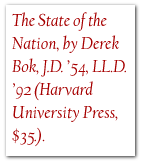Main Menu · Search ·Current Issue ·Contact ·Archives ·Centennial ·Letters to the Editor ·FAQs
![]()
| The Government We Need | Films: 23-Skiddo and Aloha |
| Off The Shelf | Chapter & Verse |
| Open Book: The Abduction of Phil Esposito | |

 Illustration by Stuart Bradford |
Using the most reliable quantitative research available, Bok compares the state of the nation today to its state in 1960 and to the record of our main trading partners abroad. On the whole he finds progress in the domestic comparison and a laggard mediocrity in the international. His criteria are "five major aims" that "have consistently gained the approval of large majorities ever since polling organizations" began inventorying public attitudes in the 1950s. These national aims or goals are:
- to have a prosperous economy;
- to enjoy a high quality of life beyond the economy--for example, a healthy physical and cultural environment;
- to offer opportunity to all;
- to possess some measure of security "against the principal hazards of life"; and
- to preserve a set of fundamental values by which to mark our moral condition.
Bok's subtitle is "Government and the Quest for a Better Society," and if his commitment to objectivity is unfashionable, so is the assumption behind his subtitle--that government can and should help America to realize its basic aims. President Clinton declares that the era of big government is over while a "plurality of Americans," Bok asserts, "now believe that Washington poses the greatest threat to the welfare of the nation," even though "no country has yet approximated" a society accordant with our goals "without the aid of a strong and active government."
The public's loss of faith in government, in turn, feeds on its disgust with politics. Bok depicts this disgust as so much uninformed populist attitudinizing. Disappointingly, he does not allow for what one might call informed alienation, and so seriously underestimates the difficulty of restoring the public's faith in government. He cites "studies of the legislative process" that argue that lobbyists and campaign contributions have "less impact on policy than popular opinion supposes." One wonders: did these studies reach that conclusion before the insurance and small-business lobbies had dispatched the Clinton health-care reform initiative? In any case, the smoking-gun standard of impact on policy is a myopic one. It is the appearance of government being for sale, as much as any flagrant proofs of the sale, that eats away at public faith. A man sitting by himself downstairs in a bordello may be chaste, but his wife would be a fool not to assume the worst about him. Bok is right: affirmative government is necessary to achieve our national aims. But unless we first close down the bordello of American politics, we will not trust government enough to get the government we need.
![]()
Bok's chapters on prosperity contain at least one piece of unambiguously good news: our scientists still lead the world in papers published in refereed journals and in papers cited in other papers (though Japan leads in the application of science to economically significant technology). Otherwise, these chapters trace a pattern of a tenuous and ever-narrowing prosperity. While real wages for the bottom 10 percent of the Japanese labor force rose by 40 percent between 1979 and 1989, and even rose modestly for the same stratum of the British labor force, real wages for the poorest 40 percent of American families either failed to rise or actually fell. In other words, both the Japanese and British economies have been doing better for the bottom 10 percent than the U.S. economy does for the bottom 40 percent.
American workers are still the most productive in the world, but this is largely because we expose more of our economy to foreign competition than do our trading partners, who, as they open their markets, will cancel out the source of our competitive advantage. Currently, U.S. productivity rises 1 percent a year. In a sentence Bob Dole could have used in making the case for higher growth, Bok says that over 20 years "a 1 percent addition to our growth rate...could wipe out the budget deficit, restore the viability of our Social Security program, increase the incomes of all families, and still leave enough money in additional tax revenues to extend health insurance to every American and fully pay for a host of other social programs that are now only partially funded or about to be cut back."
That higher growth rate is not likely to come either from new investment--we rank last among our main trading partners in total investment--or from superior social capital. While some test scores for U.S. students have (contrary to conventional wisdom) risen slightly since 1960, our children rank behind our competitors' in every percentile except the top 1 percent. One cause is clear: although only 7 percent of U.S. students spend more than four hours a week on science homework, 20 percent spend five or more hours a day watching television. The cathode ray tube may well be among the most pernicious inventions since gunpowder.
![]()
After touring U.S. cities, a group of european urban specialists wrote that
conditions were such as "to be expected in a poverty-stricken Third World country,
not in one of the world's richest nations." Government neglect is partly responsible:
between 1980 and 1990 the share of federal money spent on cities declined from
15 to "barely" 6 percent. On the one hand, more than half of the $70 billion
annually taken in the mortgage-interest deduction goes to families in the  top
20 percent of the income scale. On the other hand, 77 percent of low-income
renters were paying 35 percent or more of their incomes for rent in 1987, up
nearly 10 points from 1960. Rent is not deductible on federal tax forms. Someday,
perhaps, a progressive-populist political party will make it so. Until then,
upper-middle-class housing will be subsidized by the taxes of lower-income renters.
top
20 percent of the income scale. On the other hand, 77 percent of low-income
renters were paying 35 percent or more of their incomes for rent in 1987, up
nearly 10 points from 1960. Rent is not deductible on federal tax forms. Someday,
perhaps, a progressive-populist political party will make it so. Until then,
upper-middle-class housing will be subsidized by the taxes of lower-income renters.
Bok calculates that the public and private sectors together have spent more than a trillion dollars on the environment since 1970--with mixed results. Water quality appears to have improved, but the cleanup of toxic waste proceeds at a glacial pace and improvements in air quality have not matched those in Japan and Europe. Yet this modest progress has cost "several times more than was theoretically necessary," because of our litigious political culture and because of a peculiar dialectic of public opinion about the environment that is driven by economic anxiety. "The anti-environmental push of the nineties," to quote William Ruckelshaus, former director of the Environmental Protection Agency, "is prompted by the pro-environmental excess of the late eighties, which was prompted by the anti-environmental excess of the early eighties, which was prompted by the pro-environmental excess of the seventies, which was prompted...but why go on?"
The one clear success Bok credits to government in improving the quality of life since 1960 lies in its support of the arts through the widely derided National Endowment for the Arts (NEA). Yet in no other area is the gap between Europe and America greater: while the NEA's budget reached $167 million in 1994, France in 1990 budgeted $7 billion.
![]()
Americans appear to believe in inequality; at any rate only 29 percent think government should take steps to reduce income inequality, compared to 61 percent of Germans, 64 percent of Britons, and 81 percent of Italians. Inequality, we stubbornly assume, is the price of success; mitigate the one, and we'll put the other at risk. We maintain this belief even as the promise of success narrows fearfully in the new winner-take-all economy. We maintain it, Bok observes, even as it becomes harder and harder to make the case that specific inequalities are necessary to preserve economic dynamism. For example, what economic purpose does it serve that the Special Supplemental Food Program for Women, Infants, and Children (WIC) reaches only 60 percent of those eligible? Or that 8 million children are neither enrolled in Medicaid nor covered by private health insurance? Or that the chances of a child from the lowest income quartile earning a college degree are nine times lower than those of a child from the top income quartile? Would the taxes necessary to feed, insure, and educate these children damage the economy? Surely not so much as the lifelong attrition of hope they will face.
"Far from doing more than other nations to improve opportunities for the very young," Bok writes, "the United States does considerably less." Will this remain true as opportunity for the middle class continues its palpable erosion--as the truth registers on more and more of us that our kids are only a death or divorce or downsizing away from being like their kids? Those who hope for the emergence of a solidarity of the economically insecure that links the middle class and the poor cannot find much to cheer in the recent elections.
The State of the Nation brims with arresting information and well-pondered, often eloquent, judgments. For example:
Bok on race--"It is a bitter lesson indeed to discover that laws to desegregate the schools are enough to lead white parents to enroll their children in private schools, that fair-housing ordinances can cause white families to sell their homes and move to other communities, and that preferential admissions policies and affirmative-action laws quickly provoke humiliating debates questioning the native intelligence and intellectual competence of one's race."
Bok on violent crime--"And whether or not prolonged incarceration actually deters much violent crime, it should still reduce it by keeping more criminals behind bars, where they cannot harm others. As John DiIulio asserts, the increased use of imprisonment saved Americans 66,000 rapes, 323,000 robberies, 380,000 assaults, and 3.3 million burglaries in 1989 alone." (Yet Bok is critical of long mandatory sentences and, in general, of a law enforcement establishment dedicated to the punishment, not the prevention, of crime. Objectivity leads him to cite DiIulio's findings.)
Bok on unions--"In a 1991 survey, 47 percent of the respondents indicated that 'if a union did organize my workplace, I would be inclined to support it.' Yet 41 percent replied that it was likely that they would lose their jobs if they tried to join a union, and 79 percent thought that nonunion workers would be fired if they openly participated in trying to organize a union."
Bok on American values--"[A] distinguishing feature of America's treatment of freedom is the contrast between the elaborate protection given to political, intellectual, and artistic freedoms and the absence of any affirmative constitutional rights to such basic necessities as food, jobs, shelter, and health care."
To end this review in a strange place, some years ago I read a Japanese historian's account of the Pacific War, and what stayed in my mind was the way Japanese culture--from the racist belief in the contemptible character of non-Japanese peoples to the warrior cult of bushido--brought destruction on the Japanese nation. The Pacific War was a case, to use the title of Jules Henry's book of the 1960s, of Culture against Man. Hegel theorized that civilizations decline by an intensification of their own first principles. Is something like that happening now to American civilization? Is American individualism doing to us what bushido and the like did to the Japanese in World War II--playing us terribly false, leading us away from the political and governmental innovations that alone can address our mounting problems? It is among the merits of this valuable book to leave one asking such questions.
Jack Beatty is senior editor of The Atlantic Monthly and author of The Rascal King: The Life and Times of James Michael Curley (1992). He is now at work on an intellectual portrait of Peter F. Drucker.